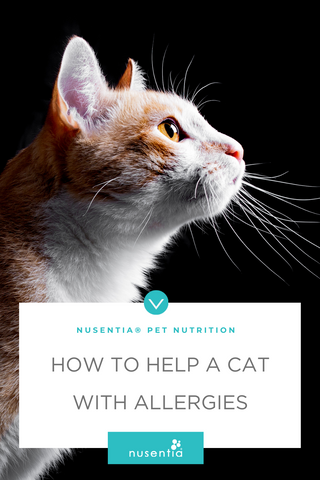Hey there, curious about if your feline companion can suffer from allergies? You might be surprised to learn that cats can indeed experience allergies! Deciphering the signs can be challenging, as cats are experts at hiding discomfort.
So, you might wonder, "my cat has allergies, what can I do to help?" Let's explore the symptoms and where natural remedies may apply.

Understanding Cat Allergies: A Guide to Help Your Furry Friend
Cats can develop allergies to various substances, including food allergies, contact allergies, and environmental allergens. Animal proteins such as beef, fish, and chicken are common culprits, alongside plant proteins like wheat and corn. Cats may also react to non-protein items such as fungi and food colorants. Environmental triggers can range from household soaps and dust to pollen and smoke, with some cats even reacting to the dust from their litter.
Do cats experience seasonal allergies?
Absolutely, cats can have seasonal allergies, reacting to the same environmental allergens that affect humans, such as pollen and dust.
What leads to allergies in cats?
Allergies arise when a cat's immune system overreacts to certain substances, whether ingested, inhaled, or through skin contact, affecting their digestive, respiratory, or integumentary systems.

Identifying Allergy Symptoms in Cats
The symptoms of cat allergies can vary widely. Food allergies often present as vomiting and diarrhea, while contact allergies typically affect areas with less fur, causing redness, irritation, and hair loss. Environmental allergies might lead to allergic bronchitis, characterized by wheezing and breathing difficulties.
Seasonal allergies in cats can manifest as:
- Sneezing: A common sign, similar to humans.
- Itchy skin: Excessive scratching, biting, or licking could indicate skin irritation.
- Watery eyes: Accompanied by discharge, a telltale sign of seasonal allergies.
- Coughing or wheezing: Symptoms of inflammation in the airways due to allergies.
- Ear infections: Inflammation from allergies can lead to discomfort and infection.
Suspecting Allergies in Your Cat? Here's What to Do
If you're asking, how to get rid of allergies, start by monitoring their behavior and symptoms closely. Keeping a symptom diary can be incredibly insightful. Then, consult your veterinarian to review your observations and develop a tailored action plan.
Easing Your Cat's Allergies Naturally: Effective Strategies
Medications and supplements
Tailoring your approach based on the allergy type is crucial. Your vet might suggest dietary changes, hypoallergenic products, or specific medications. Including probiotics in your cat's diet can support a healthy immune system, vital for managing allergies. These beneficial bacteria aid in maintaining gut health, which is pivotal for overall well-being, helping to alleviate allergies and inflammation.
Enhancing your cat's diet with Spectrin's™ multivitamin and antioxidant supplements can provide additional support for managing allergies, ensuring your cat receives a balanced spectrum of nutrients for optimal health.
Good Nutrition: A Foundation for Allergy Management in Cats
Adopting a holistic approach, using allergy home remedies, to your cat's health is crucial when managing allergies. A balanced diet, rich in essential vitamins, minerals, and fatty acids, lays the groundwork for a robust immune system, capable of combating allergies and reducing inflammation. Incorporating comprehensive vitamin supplements and probiotics into their diet not only helps in strengthening their body's defenses but also supports overall health and vitality.
Exploring natural remedies like Probiotic Miracle® and Spectrin™ can naturally provide your feline companion with the relief they need from allergies, fostering a healthier, happier life. Remember, when it comes to helping your cat with allergies, a proactive approach centered around good nutrition and tailored care is key.

Confronting the challenge of "my cat has allergies, what can I do?" becomes less daunting with the right knowledge and resources. By understanding the signs, causes, and remedies for your cat with allergies, you're better equipped to provide your pet with a loving, supportive environment where they can thrive, free from the discomfort of allergies.




1 comment